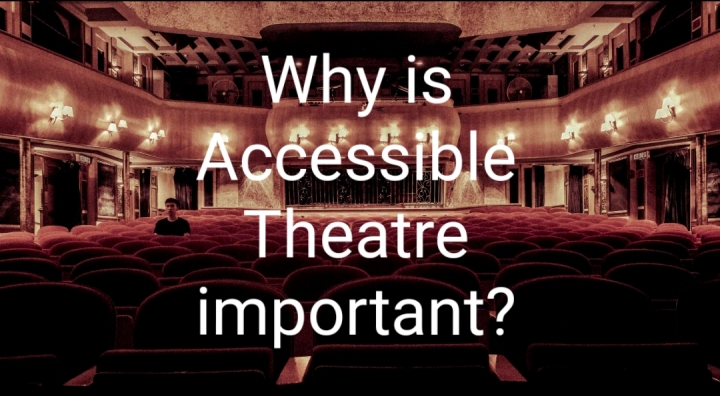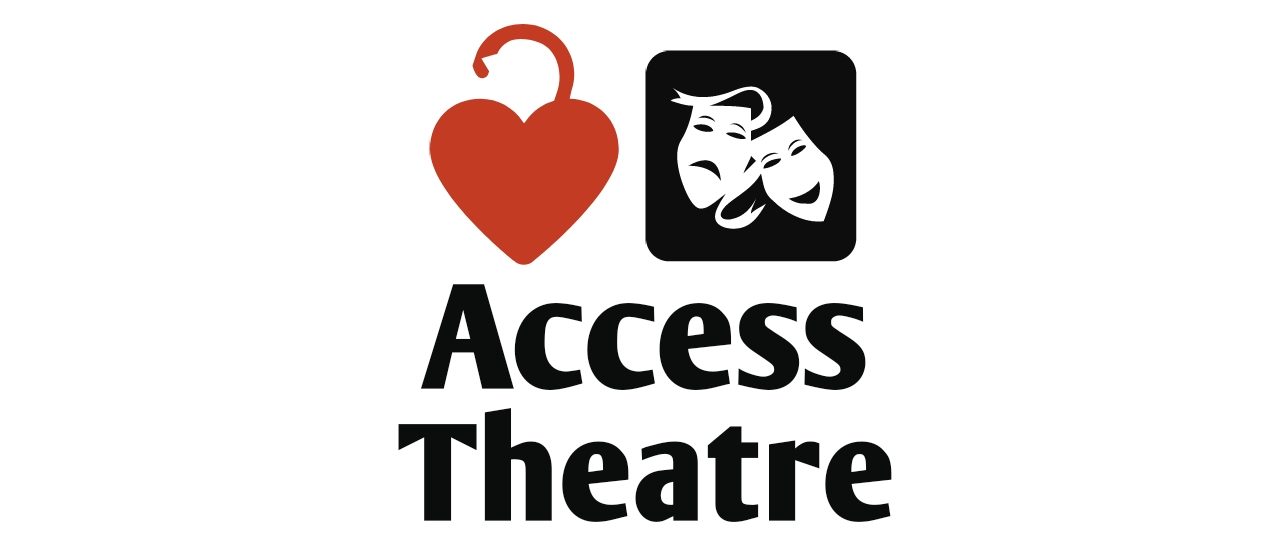
Photo by Donald Tong on Pexels.com [image description: photo of a theatre auditorium from the point of view of the stage. The seats are red and the theatre is decorated in red and gold. To the left of centre, there is one man dressed in black sat in the audience. Over the image is written “why is accessible theatre important?” in white.]
What better way to start off on the topic of access and particularly accessible theatre than to discuss why it’s important?
Put simply because all accessibility is important!
In fact, it’s a matter of the law, which is presently covered by the Equality Act 2010 and states that reasonable adjustments must be made to ensure accessibility. However, the majority of us disabled people know that “reasonable adjustments” has a wide interpretation. Many places are not wholly accessible, require much faffing about or are still not accessible at all. Which of course leads to frustration, annoyance, feeling unequal and not valued in society.
There is still a great myth that disabled people can do less than able-bodied people and whilst in some cases, that’s true, especially if illness is involved there are still many disabled people who can do just as much as an able-bodied person. The difference is not always having access! And for anyone who cannot get out as often they want to know that when they can get out it’s as easy and stress-free as possible.
One of the biggest restrictions is poor or none existent access, services and support preventing disabled people from equality and often literally stopping them entering places of work, recreation and modes of public transport.
Which is utterly ridiculous when statistics show that there are 13.3 million disabled people in the UK. That’s nearly 20% of people or 1 in 5. Ranging from being born disabled to becoming disabled later in life. From visible disabilities to invisible ones. Hearing and sight loss. Neurodiversity, Autism and a wide spectrum of learning disabilities.
In total it is thought that us 1 in 5 could generate £250 billion in spending power known as the purple pound. From a pure marketing point of view, it makes sense that businesses become more accessible. Although you’d like to think of equality and morals being a stronger driving force. Either way, businesses including The Arts are losing custom and valuable employees all due to a lack of being wholly accessible.
To bring things back to Theatre it’s important to realise that there are plenty of disabled and chronically ill people out there who enjoy The Arts but find it inaccessible. I’ll discuss reasons why in another post.
Theatre is not just entertainment it can be an escape. A chance to switch off for 2 hours. It can be social and a place of work. Or both.
It can even be a powerful educational tool. Over the years, I’ve witnessed children and teens with neurodiverse conditions and learning disabilities use theatre to creatively express themselves, develop confidence, make friends and learn about the world in a more visual/ practical way.
Theatre in Education shows allow its audience to engage and explore subjects in a safe yet accessible way that they’d never get from a classroom environment.
During my degree one of my favourite modules was Theatre in the Community in which we used drama to help train GP’s by becoming test patients as well as creating a campaign video to help local police and fire service tackle youth crime. Showing the value of The Arts in our wider community.
Many theatre companies now realise the value of community and educational engagement by partnering with all sorts of communities and groups. From local health boards to local causes. Which in itself is another step towards making theatre accessible. Again, this is something I can talk about in the future.
But the overriding message here is that Theatre and The Arts need to be accessible to audiences, artists, performers, creators, creatives and hopefully one day to all job roles from directors, front of house and backstage. It’s a valuable part of our society with powers that often go unrealised.
There needs to be access that’s more than just “reasonable adjustments” for wheelchair users and those with limited mobility but that allows people with hearing loss, sight loss, a cognitive disability, a learning disability and everything in between to enter the building and navigate it easily and safely. As well as scheduling performances that make use of sign language interpretation, technology such as audio description and caption boxes and initiatives such as relaxed performances to allow disabled people to fully engage and enjoy themselves.
As well as making theatre more accessible by taking it out of theatre buildings. Into schools and the community. Into all kinds of places that allow it to be seen by new and diverse audiences.
And just like theatre can be valuable to disabled people the same can be said in reverse. Not just for financial reasons and as audience members. There is a wealth of disabled performers and creators out there pushing to be to recognised in the mainstream. As well as others that would make valuable employees in a range of different roles. It’s important for disabled people to see themselves represented both on and off stage. Especially for young people who may think that having a disability means they can’t work in Theatre and The Arts because they don’t see anyone else doing it.
Throughout my research into accessible theatre, it’s great to see that there are more access roles being created in theatres such as Access Champions because this shows the dedication that venues and companies have towards a more diverse audience. Reflecting the importance and magnitude of access by giving it a rightful place alongside other departments and services and ultimately ensuring these principles permeate throughout the building and the work they produce. Of course ideally, where possible these roles would be occupied by disabled people because after all who knows these matters best. In an ideal world, best practice would emulate the saying “nothing about us, without us.”
I hope this post has given you more of an insight into the value of The Arts and the importance of making them accessible and I look forward to posting more about access soon.
If you too find that Theatre can often be inaccessible, for whatever reason I’d appreciate if you could answer some of the questions in this linked post: Me, my mouth and I and a discussion about accessible theatre



Musical theatre is an escape for me. You escape into the worlds of the characters and the story.
LikeLike
It’s such a great escape.
LikeLike
It is hard to describe why it is an amazing escape. The spectacle, dance, and song add something magical to the plot. Those three elements make it easier to emotionally connect to the characters. Even though I know why I love musicals- it is still hard to put into words
LikeLike
I know what you mean. It’s very therapeutic. Free from distractions.
LikeLike
Gives you a break from your life- into the life of the characters.
Even though one of my main topics on my blog is musical theatre- still hard to put into words why I love them so much. A number of factors- the spectacle, the dance, the songs, the characters, storylines, etc- you get the picture
LikeLike